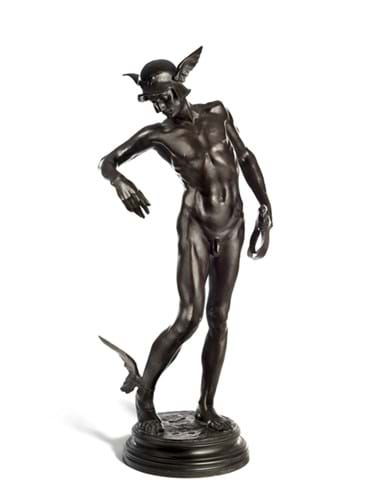
A number of examples of the sculpture in different sizes have emerged at auction in the last five years, including one that fetched £100,000 at Sotheby’s in December 2015. Bonhams’ version carries a £40,000-60,000 estimate at its Important Design Sale on October 25.
While the artist first became established after his Kiss of Victory was exhibited at the Royal Academy in 1878, it was during his subsequent period in Rome and Florence where he was influenced by the Renaissance sculptors, such as Giambologna and Cellini, that led to new developments in his work.
One of the results was Perseus Arming, a sculpture representing the mythological Greek figure arming himself to slay the Gorgon Medusa. The subject may have had a partly biographical element to it, according to Bonhams’ head of European sculpture and works of art Michael Lake.
“Perseus Arming made Gilbert’s name, and had a deeply symbolic significance for him. He saw himself in the figure of the young man girding his loins for battle – in his case, preparing to fulfil his ambitions as a sculptor. For the rest of his career, he continued to chart the course of his life through his work.”
Son of Zeus
In Greek mythology, Perseus was the son of Zeus and the mortal Danaë. Gilbert depicts him wearing the helmet lent by the God Hades to give him invisibility and the winged sandals lent by Hermes, messenger of the Gods.
Gilbert cast Perseus Arming in bronze in 1882, exhibiting it at the Grosvenor Gallery in London and also at the 1883 Paris Salon.
He later wrote: “After seeing the wonderful and heroic statue by Cellini [Perseus Beheading the Medusa], amazed as I was by that great work, it still left me somewhat cold insomuch that it failed to touch my human sympathies.
“As at that time my whole thoughts were of my artistic equipment for the future, I conceived the idea that Perseus, before becoming a hero was a mere mortal, and that he had to look to his equipment.”





